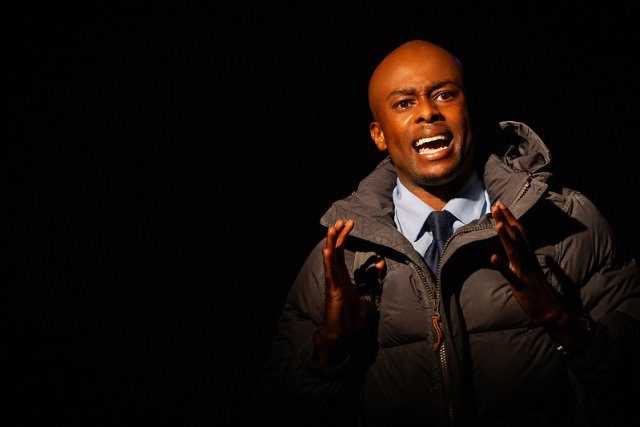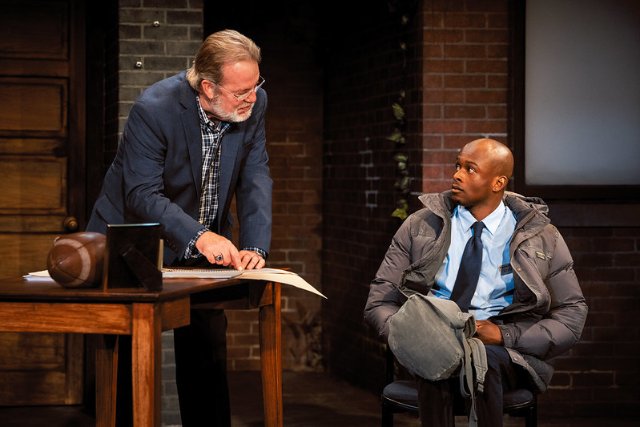Primary Trust at Barrington Stage
2024 Pulitzer Prize for Eboni Booth
By: Charles Giuliano - Sep 23, 2024
Primary Trust
By Eboni Booth
Directed by Jennifer Chang
Cast: Kenneth, (Justin Weaks); Bert (Kyle Haden); Various women (Hilary Ward); Various men (C. David Johnson)
Scenic design by Baron E. Pugh, Costume design by Danielle Preston, Lighting design by Bryan Ealey, Sound design by Salvador Zamora.
Barrington Stage Company
St. Germaine Stage
September 18 to October 13, 2024
The sparse set designed by Baron E. Pugh for the intimate St. Germaine Stage, presents a compact view of a small rural town. It includes the façade of Primary Trust, a used book store, and Wally’s a bar. There is neon trim, designed by Bryan Ealey, which flashes to demark changes in the one act, ninety minute, play by Eboni Booth. In the sound design of Salvador Zomara, the clang of a paging bell enforces the flashing neon trim. These devices loose impact with over repetition.
Evoking Our Town Kenneth (Justin Weaks) inches forward with uncertainty and a staggered delivery tells us who he is and where we are. “This is the story of a friendship. Of how I got a new job. A story of love and balance and time. And the smallest of chances. My name is Kenneth. I’m thirty-eight years old and I live in Cranberry, New York, a suburb about forty miles east of Rochester.”
An orphan, a social worker helped him to find the only job he has known. He has done everything in a used book store including keeping the books. There is a warm relationship with his boss, one of several well played roles by C. David Johnson. Because of impending heart surgery the business is being closed and he will move to Arizona.
While Kenneth is black in a white town this is not a play about race. Loneliness is the primary issue of this intimate, understated drama. That difficult to convey neurosis is revealed in increments. It takes time and patience to connect and care for this estranged, complex character. He is alert and responsive but simple and innocent. Kenneth is engaging but not the brightest bulb on the tree. There are pieces to the puzzle that Booth connects at a pace that caused some impatience.
His favorite place in town is a bar. “Wally’s is an old tiki restaurant with carpeting, and there’s always a man in a Hawaiian shirt playing the keyboard next to the salad bar. Most nights of the week you can find me at a table sipping on a mai tai. Fifteen years from now, most of that land will be cleared and covered in pavement and new condominiums, but for right now, it feels like some version of home.”
While skirting the obvious, that Kenneth is a functional alcoholic, every night he shows up at two-for-one happy hour. As presented by Booth it is less about getting trashed than hooking up boisterously with his best friend Bert (Kyle Haden). He keeps calling for another round as the decorative glasses with paper umbrellas litter the table.
Well into this routine we learn that Bert is imaginary. There are, however, detailed specifics to this robust drinking buddy that only Kenneth can see. He is based on the social worker who bailed him out when his mother died and placed him in an orphanage. More than just a pal Bert is a life coach who helps Kenneth count down through panic attacks.
Representing the passage of time we hear a succession of waitresses and one waiter (all played with sharp distinction) by Hilary Ward. One of these personas is Corinna, the other black person in Cranberry, who takes a liking to him. They agree on a date. He suggests Wally’s but she nixes that and suggests a French restaurant. When they don’t serve mai tai’s he agrees to a dirty martini with extra olives. That’s a big step for him.
Sharing that he is out of work she suggests the bank which is hiring. It seems that his mother worked in a bank. While minimally educated he’s good with numbers. The manager is short on tellers and sends him home with an employee manual as thick as a telephone book. Part of the job entails getting customers to sign up for other services from CD’s to credit cards and equity loans.
The bank manager, a football enthusiast, coaches him along and invites him to after work drinking sessions with fellow employees. Despite the networking benefits there is no way that Kenneth will abandon Bert and Wally’s.
A “people person” he’s good at his new job. On every level it’s a demanding step up from the book store. Within months he’s the front runner for a bonus award that will be presented with a gala at the Raddison.
Switching hats, Ward plays several of his clients. It gets complicated when Bert shows up interfering with a difficult client. There’s a meltdown and that would seem to be the end of his gig. It isn’t but we won’t spoil how it all comes out.
Early on in his role as artistic director, Alan Paul, saw the play at its off Broadway premiere. He booked it for Barrington before it won a Pulitzer Prize. The production at Barrington Stage couldn’t be more timely. Not surprisingly this deliciously intimate drama is well on its way to a sold out run.





